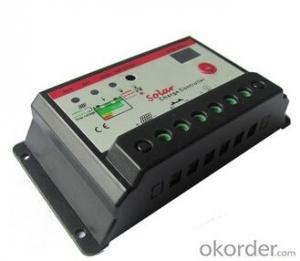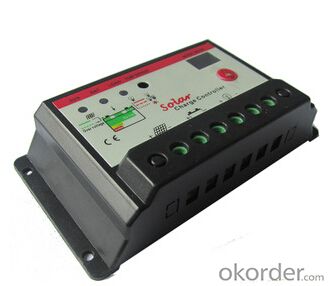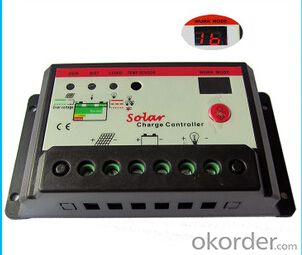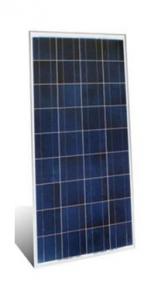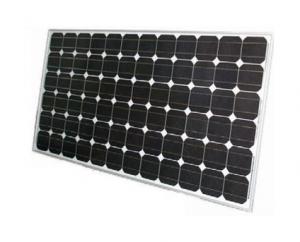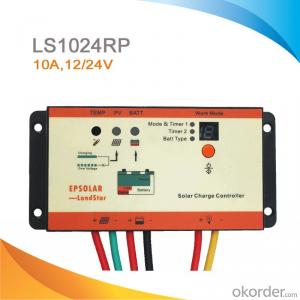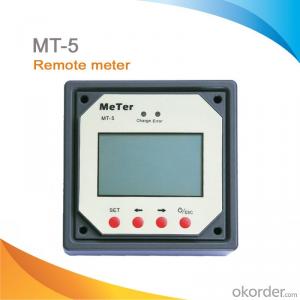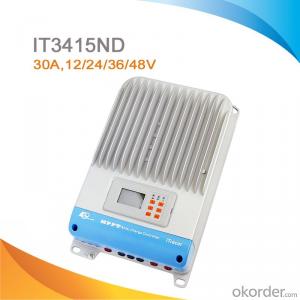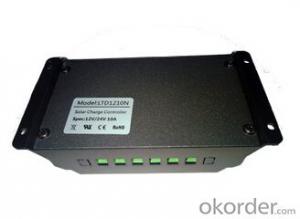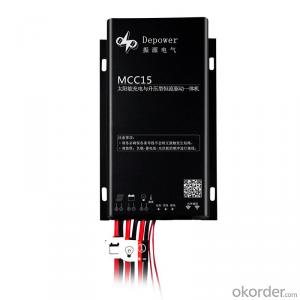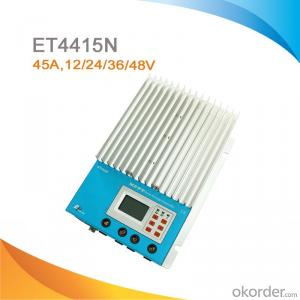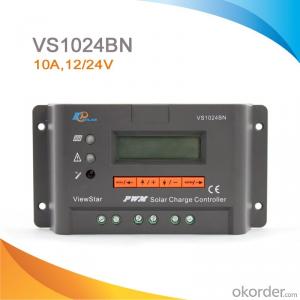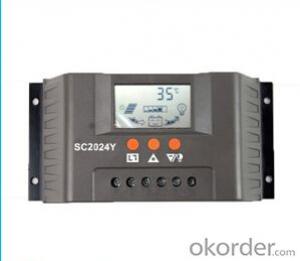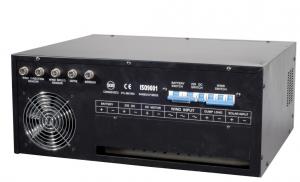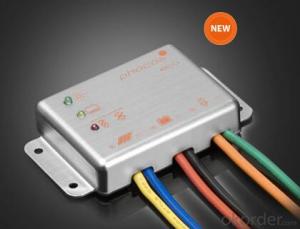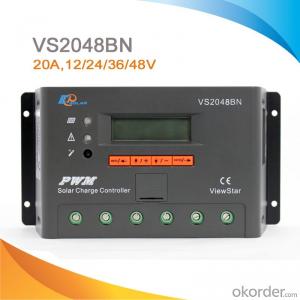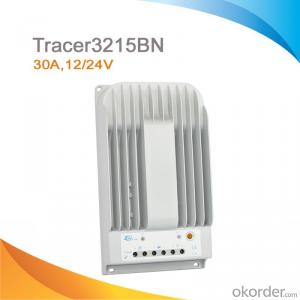60A MPPT Solar Controllers bygd Solar Charger Controller Model SC1524S for Streetlight System
- Loading Port:
- Shanghai
- Payment Terms:
- TT OR LC
- Min Order Qty:
- 10 unit
- Supply Capability:
- 50 unit/month
OKorder Service Pledge
OKorder Financial Service
You Might Also Like
Details of products:
product model: SC1524S 15A
External Size:133mm×70mm
Mounting hole Size:126mm×50mm
Performance
12V/24V automatical adaption, control and set button changed into tact key, larger contact terminal can offer wire of 6 m2
◆ double LED digital display, clear for observation
◆ recharging mode by three phases
◆ PWM pulse modulated recharging technology
◆set light-dependent control and 1-13hous time control
◆short circuit protection, overvoltage protection, overcurrent protection and lighting protection
◆standy current no more than 5mA
example
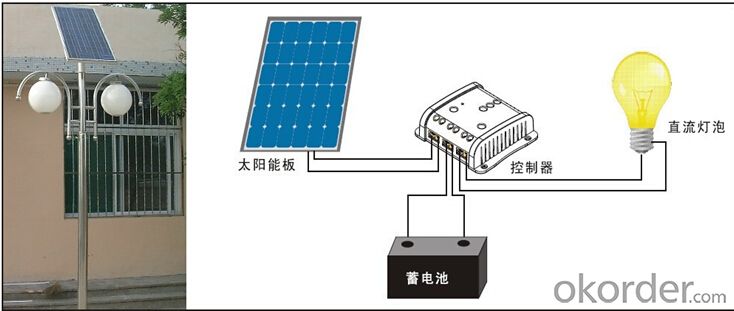
Technical characteristics
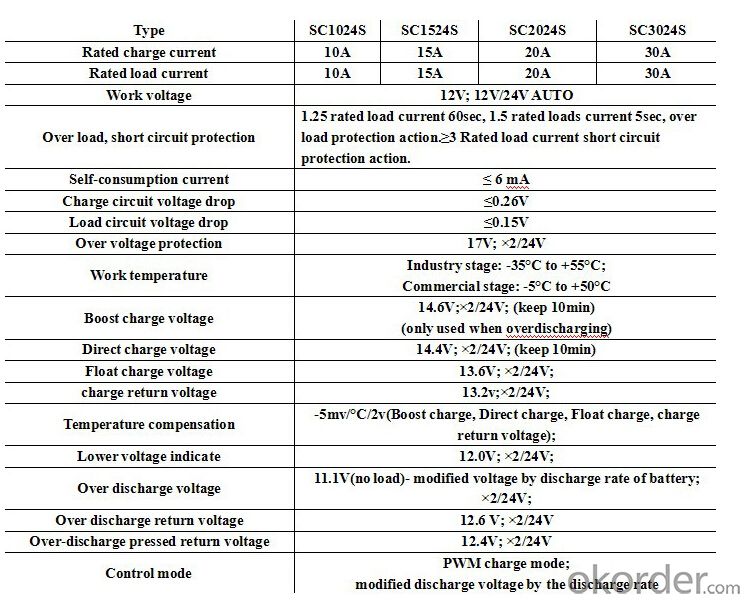
P.S.: This product is manufactured by order, so please call us for more info and service
- Q: How does a solar controller handle voltage drop in the wiring?
- A solar controller handles voltage drop in the wiring by using a technique called PWM (Pulse Width Modulation) regulation. When there is a voltage drop in the wiring between the solar panels and the controller, the controller compensates for it by adjusting the duty cycle of the PWM signal. The solar controller constantly monitors the voltage at the panels and compares it to the desired voltage. If there is a drop in voltage due to wiring resistance, the controller increases the duty cycle of the PWM signal. This means that the controller allows more current to flow through the wiring, compensating for the voltage drop. By adjusting the duty cycle, the controller is able to maintain a constant voltage at the panels, ensuring that the maximum power output is achieved. This is important because voltage drop in the wiring can significantly reduce the efficiency of the solar system, leading to lower power generation. In addition to PWM regulation, some advanced solar controllers also employ MPPT (Maximum Power Point Tracking) technology. MPPT controllers are able to dynamically adjust the voltage and current to achieve the maximum power output from the solar panels. This technology further enhances the controller's ability to handle voltage drop in the wiring and optimize the system's performance.
- Q: What is the maximum load current a solar controller can handle?
- The maximum load current a solar controller can handle depends on the specific model and its specifications. It can vary greatly, ranging from a few amps to several hundred amps. It is important to check the manufacturer's instructions and specifications for the solar controller being used to determine its maximum load current capacity.
- Q: What is the maximum number of load control modes supported by a solar controller?
- The maximum number of load control modes supported by a solar controller can vary depending on the specific model and manufacturer. However, most solar controllers typically support around 4 to 5 load control modes, allowing users to customize and optimize their energy usage according to their specific needs and preferences.
- Q: How does a solar controller handle battery equalization?
- A solar controller handles battery equalization by regulating the charging process to ensure that all cells within the battery are charged uniformly. It monitors the voltage of each individual cell and adjusts the charging voltage and current accordingly to prevent overcharging or undercharging of any specific cell. This helps to maintain the overall health and longevity of the battery by preventing imbalances between cells and promoting their equalization.
- Q: What is the role of a battery voltage sensor in a solar controller?
- The role of a battery voltage sensor in a solar controller is to monitor the voltage level of the battery, ensuring that it remains within safe operating limits. This sensor helps to prevent overcharging or deep discharging of the battery, which can lead to damage or reduced lifespan. By continuously measuring the battery voltage, the solar controller can regulate the charging process and optimize energy flow from the solar panels to the battery, maximizing efficiency and ensuring the battery's longevity.
- Q: How does a solar controller handle power surges from the solar panels?
- The flow of power from solar panels to the battery bank or electrical grid is regulated by a solar controller, which is a crucial component in a solar power system. Safeguarding the system is a crucial role played by a solar controller when it comes to dealing with power surges from the solar panels. Power surges can occur due to various reasons like sudden changes in weather conditions, fluctuations in solar radiation, or issues with the solar panel itself. If not handled properly, these surges can potentially damage the system and its components. To handle power surges, a solar controller usually includes several protective mechanisms. One of its primary functions is to prevent overcharging of the battery bank. Whenever a power surge occurs, the solar controller detects the excess voltage and current and limits the charging rate to ensure that the battery does not get overcharged. This helps in maintaining the battery's health and prolonging its lifespan. Moreover, solar controllers often incorporate devices such as surge protectors or voltage clamps for transient voltage suppression. These devices help in absorbing and diverting excessive voltage spikes away from the system, thereby preventing damage to the solar panels, controller, batteries, or other connected devices. In addition, some advanced solar controllers utilize Maximum Power Point Tracking (MPPT) technology. This technology optimizes the power output of the solar panels by dynamically adjusting the voltage and current, even during power surges. MPPT controllers enhance the system's efficiency while minimizing the impact of power fluctuations. In conclusion, a solar controller regulates the charging rate to prevent overcharging, incorporates surge protection devices, and utilizes MPPT technology to optimize power output when handling power surges from the solar panels. These protective features ensure system stability, protect components from damage, and maximize the efficiency of the solar power system.
- Q: What is the maximum battery voltage for a solar controller?
- The maximum battery voltage for a solar controller typically depends on the specific model and manufacturer. However, most solar controllers are designed to work with battery systems that have a maximum voltage of 12 volts, 24 volts, or 48 volts. It is important to consult the specifications and guidelines provided by the manufacturer to ensure compatibility and avoid any damage to the controller or battery system.
- Q: Can a solar controller be used with solar panels of different weights?
- Solar panels of different weights can be used with a solar controller. The function of a solar controller is to manage the electricity flow from the panels to the battery or load. The weight of the panels does not affect this. When selecting a solar controller, it is important to consider the voltage and current ratings of the panels, which should align with the controller's specifications. As long as the voltage and current ratings are compatible, the solar controller can be utilized with solar panels of varying weights.
- Q: What is the maximum charging current that a solar controller can handle?
- The maximum charging current that a solar controller can handle depends on its specifications and capabilities. Different solar controllers have different maximum charging current ratings, typically ranging from around 10 amps to 60 amps or more. It is important to consult the manufacturer's specifications or product documentation to determine the specific maximum charging current for a particular solar controller model.
- Q: What are the key features to look for in a solar controller?
- The key features to look for in a solar controller include maximum charging current and voltage, compatibility with different battery types, temperature compensation, load control capabilities, and advanced protection measures such as overcharge, over-discharge, and reverse polarity protection.
Send your message to us
60A MPPT Solar Controllers bygd Solar Charger Controller Model SC1524S for Streetlight System
- Loading Port:
- Shanghai
- Payment Terms:
- TT OR LC
- Min Order Qty:
- 10 unit
- Supply Capability:
- 50 unit/month
OKorder Service Pledge
OKorder Financial Service
Similar products
Hot products
Hot Searches
Related keywords
